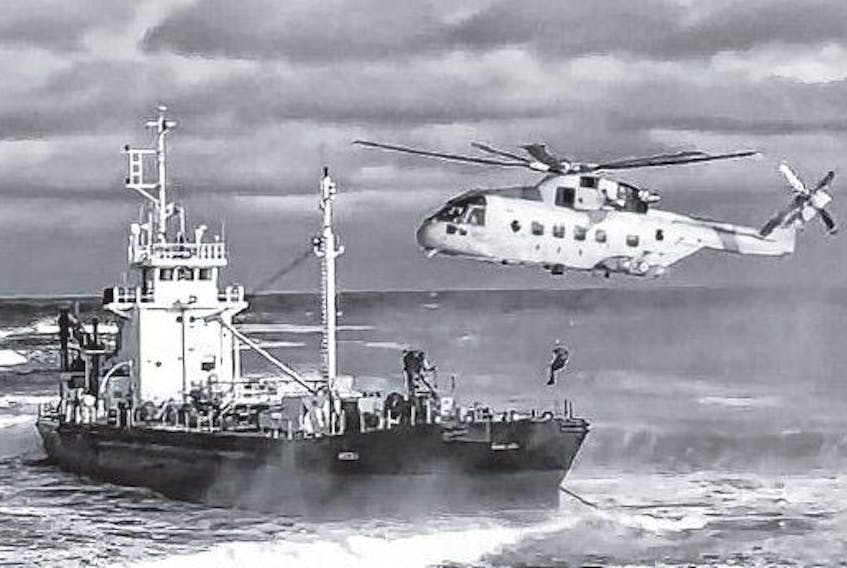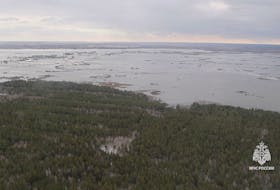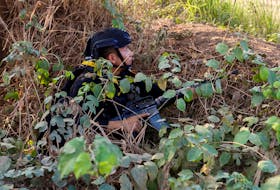A bunker tanker that went aground last January near Sydney had shoddy maintenance and voyage planning and an unqualified crew, a Transportation Safety Board investigation has found.
Arca 1, built in Ontario in 1963, was decommissioned in 2014 and laid up at at the Sorel shipyard in Quebec until being sold to the Mexican company Petroil Marine in 2016.
The owner attempted to register the tanker as a Canadian yacht for the purpose of ferrying it to Mexico but was denied, and later obtained registration under the Panama flag.
In December 2016, the Panama Maritime Authority issued a minimum safe manning certificate as well as a single voyage for delivery authorization from Sorel to Mazatlán, Mexico. The vessel was en route to Mexico when it met heavy weather and went aground at Little Pond, on Jan. 8, 2017, due to a failure of the port propulsion clutch.
The six crew on board were rescued by the Canadian Coast Guard and sustained no injuries, and there was no pollution as a result of the mishap, but the vessel sustained major damage to the hull and propulsion machinery. The ship was refloated and towed to Sydney several days later, and its owner eventually brought the vessel to its final destination on
board a heavy-lift transport.
The Transportation Safety Board (TSB), a federal body that investigates marine, pipeline, rail and air mishaps, said in its report on the incident, released Monday, that Transport Canada inspected the ship several weeks prior to its departure and identified 13 deficiencies related to radio equipment, life-saving equipment, the number of crew, the certification of crew members, and voyage planning.
The ship’s crew made adjustments and was eventually given the green light to sail.
But according to the TSB’s report, the main propulsion clutch was not checked and adjusted by the crew before or during the voyage as per the manufacturer’s recommendation. As a result, the clutch failed due to slippage, causing the loss of port propulsion and a reduction of vessel speed. The loss of speed increased the time required to reach Sydney, preventing the vessel’s arrival before weather deteriorated.
Also, the master made a decision to sail even though the sea conditions were forecast to be in excess of the limitations imposed by the ship’s authorization.
The investigation also found that the master, who had previously worked for the U.S. Coast Guard, was not qualified to act as master of the vessel and the motorman only held a Canadianissued engine room rating certificate and was not qualified to act as chief engineer.
Although the master’s job was officially changed to engineer, and the second mate’s job was changed to master in order to comply with conditions, these two crew members continued to carry out their original duties.
Karl Risser, the East Coast representative for the International Transport Workers’ Federation, said the Arca 1 is an example of a growing number of ships that are referred to as “flag of convenience” vessels, where a company will buy a vessel and register it under the flag of a country with lax regulations.
“In the global picture, everybody migrates to that Panama registry because the taxation is good, the rules are lax, and they can cut the corners,” Risser said.
Risser said as a signatory to the Maritime Labour Convention, Transport Canada has an obligation to do inspections on these vessels when they are in Canadian waters to ensure everyone has the right qualifications and that the ship is up to safe standard before it leaves port.
But as more and more flag of convenience ships pop up, inspecting and enforcing them has become a greater burden on the agency, which Risser said is already underfunded. The International Transport Workers’ Federation is a global organization that inspects ships to ensure adequate working conditions.
“If Canada is moving towards allowing more of these flag of convenience vessels to come into our waters, we have to ramp up the enforcement side of that,” he said.
“We can’t just put our head in the ground and hope that nothing goes wrong.”
Risser said it was sheer luck that there was no pollution or injuries as a result of the Arca 1 mishap, but one only needs to look to the Cyprus-flagged MV Marathassa that leaked 2,700 litres of fuel into B.C. waters in 2015 to see what could happen.
According to marinetraffic.com, the Arca 1 is now moored near Mazatlán. The TSB report says the owner has contracted Mexican maritime authorities to certify the vessel for operation in ports and for short distance coastal navigation, and an agreement has been signed with Lloyd’s Register to certify the vessel and the company’s management processes under international safety management rules. It’s likely nothing more will come out of the investigation, Risser said.
“There’s very little ability to get these guys and hold them accountable for things that go wrong,” he said.
“They hide behind this flag of convenience system that’s built to hide them.”









